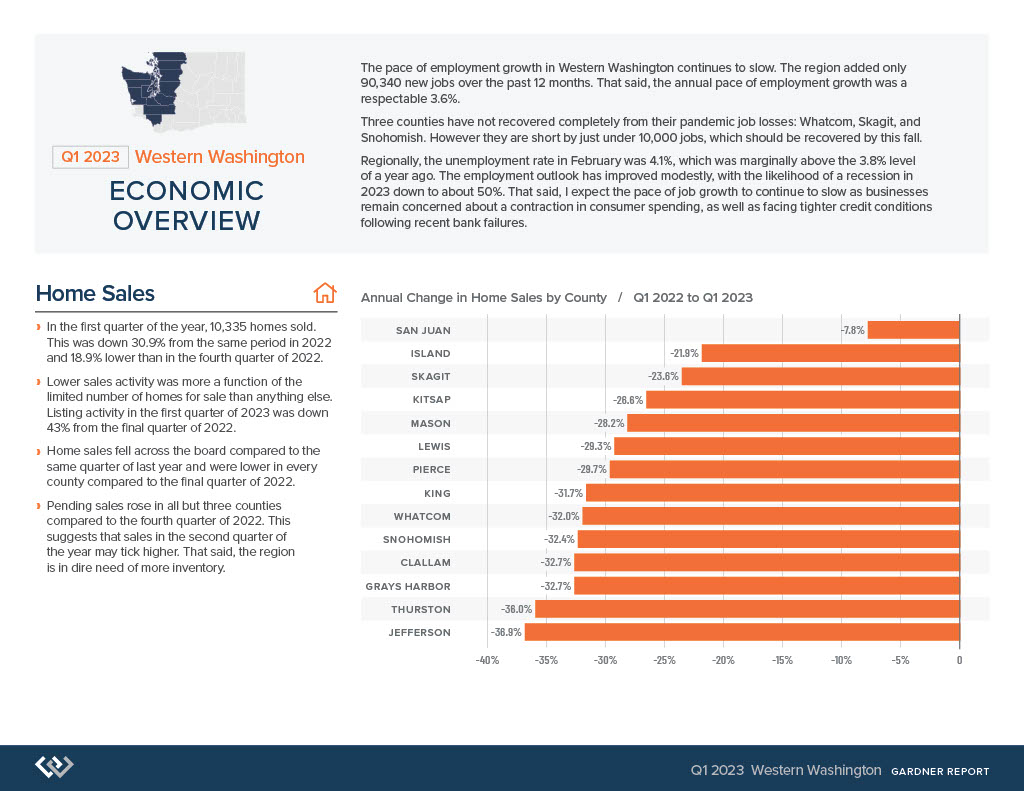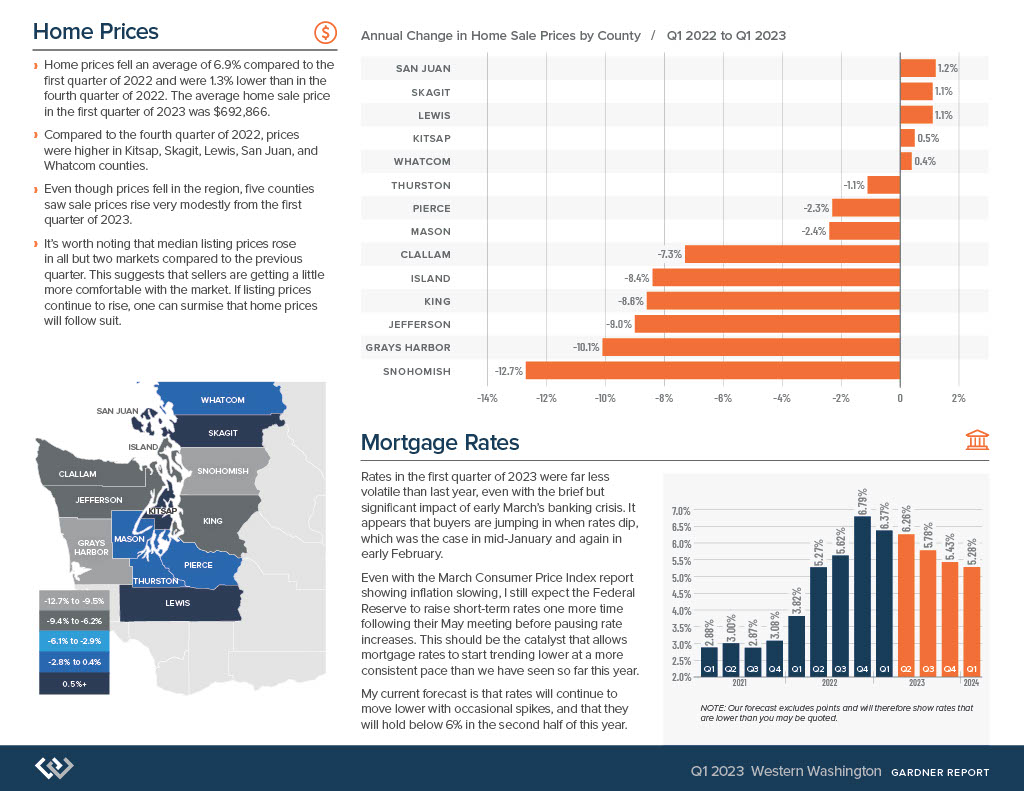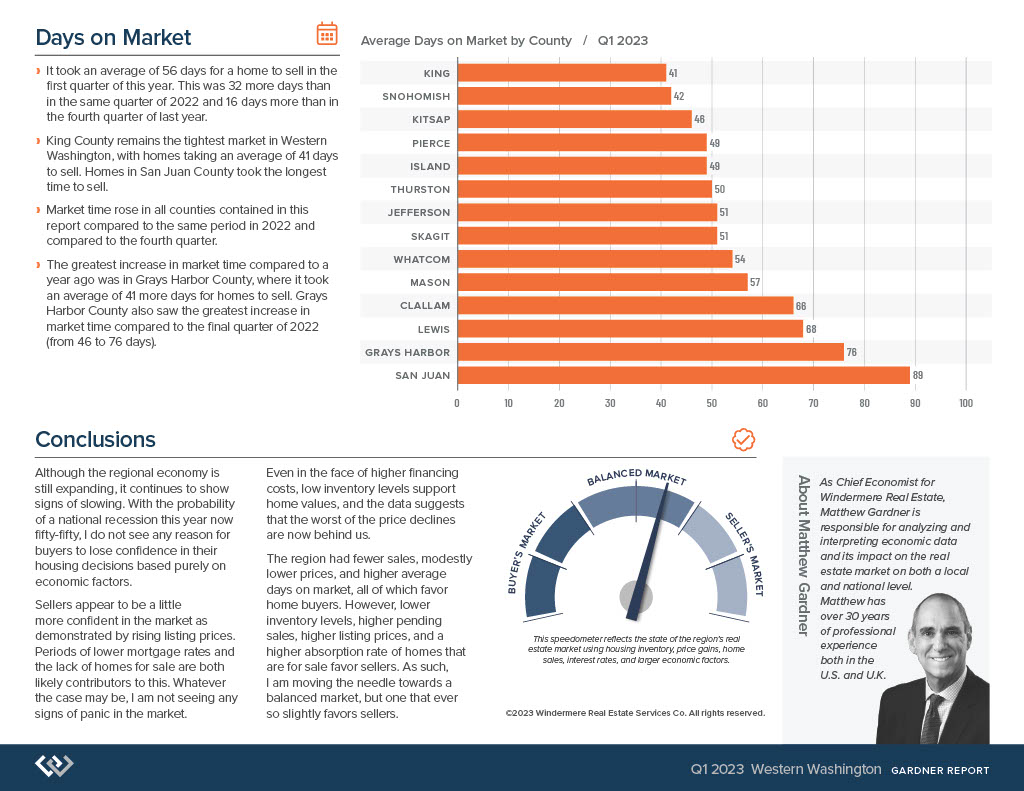Spring Cleaning

Spring cleaning has long been a cherished tradition embraced by households worldwide. Stemming from a practical need to freshen up living spaces after the long winter months, this annual ritual has evolved into a symbol of renewal and rejuvenation. Beyond simply tidying up, spring cleaning holds significant importance for both physical and mental well-being. By clearing out clutter, dust, and grime accumulated over the winter, we create a cleaner and healthier environment for ourselves and our families. Moreover, the act of spring cleaning can have positive effects on our mindset, providing a sense of accomplishment, satisfaction, and a renewed energy to tackle new challenges. Embracing this tradition allows us to start the new season on a clean slate, fostering a sense of optimism and positivity as we welcome the warmer days ahead.
Follow along for a comprehensive spring cleaning checklist to help you tackle every corner of your home:
Declutter and Donate
- Make your home more inviting by decluttering. Go through each room and declutter by getting rid of items you no longer need or use.
- Donate, sell, or discard items that are no longer serving a purpose for you. Consign your items at places like My Sisters Closet, or host a yard sale and feel a sense of accomplishment when you can fund something new. Whatever you find yourself still left with donate to a local thrift store. Island Thrift, WAIF Thrift Shop , and Treasure Island-Antique and Thrift are just a few of the many options on Whidbey Island.
Dust
- Open your windows and breathe a breath of fresh air.
- Dust all surfaces, including shelves, countertops, furniture, and electronics.
- Don’t forget to dust ceiling fans, light fixtures, and vents.
Clean Windows
- Spring brings so much outside beauty. Make sure you can enjoy it all with sparkling windows.
- Wash windows inside and out, including the window frames and sills. If your window has weeping holes, be sure to make sure they are not clogged so that excess water can drain properly.
- If cleaning your windows is out of reach there are companies like A Clean Streak or Oh Say Can You See that can help.
- Clean blinds, curtains, or drapes according to manufacturer’s instructions.
Vacuum and Clean Floors
- Vacuum carpets and area rugs thoroughly.
- Sweep and mop hard floors, paying special attention to corners and baseboards.
Deep Clean Kitchen and Restrooms
- Clean and disinfect countertops, cabinets, and drawers, all bathroom surfaces, including sinks, toilets, and tubs/showers.
- Clean appliances inside and out, including the refrigerator, oven, microwave, and dishwasher.
- Degrease stove hood and filter.
- Scrub tile grout and remove any mold or mildew.
Organize Closets and Cabinets
- Out with the old and in with the new… or maybe just move the sweaters to the back (we are still in the PNW and occasionally will still need those sweaters), but break out the vibrant tank tops it is spring already!
- Declutter and organize closets and cabinets, donating or discarding items as needed.
- Use storage bins or baskets to keep items organized and easily accessible.
Freshen up Bedding
- Launder bedding, including sheets, pillowcases, and duvet covers.
- To increase the life of your mattress, rotate and flip it for even wear.
Clean Upholstery and Furniture
- Vacuum upholstery and cushions to remove dust and debris. Make sure you get behind and underneath.
- Spot clean stains and spills on furniture.
Tidy Outdoor Spaces
- Sweep or pressure wash outdoor patios, decks, and walkways.
- Clean outdoor furniture and cushions.
- Trim bushes, trees, and clean up garden beds.
Inspect and Maintain
- Ensure your families safety every season.
- Check smoke detectors and carbon monoxide detectors, replacing batteries as needed.
- Test and clean ceiling fans.
- Schedule routine maintenance for HVAC systems, plumbing, and electrical systems.
Final Touches
- Brings some of the outside in.
- Add finishing touches such as fresh flowers or plants to bring life into your space.
- Sit back, relax, and enjoy your freshly cleaned and organized home!
Spring cleaning isn’t just about tidying up—it’s also an essential part of home maintenance and preparation for the warmer months ahead. For homeowners, it’s an opportunity to refresh their living spaces and ensure that their property is in top condition. Beyond the aesthetic benefits, a thorough spring cleaning can enhance the value of a home by improving its curb appeal and overall appeal to potential buyers. By decluttering, organizing, and performing deep cleaning tasks, homeowners can showcase their property’s full potential and make a positive impression on prospective buyers. Additionally, addressing maintenance issues early can help prevent costly repairs down the line and contribute to the long-term health and durability of the home. So, as spring approaches, embrace the tradition of spring cleaning as a valuable investment in both your home and your well-being.
If you are considering selling this Spring, connect with us.
To help get you motivated listen to our Spring Cleaning Playlist Here.
Retirement in your future?

If retirement is in your near future, or perhaps you are already there (congratulations) you may find yourself wondering if staying in your home is still a good fit. When you live in a home for an extended period, it is normal for your needs to change as you progress through life’s milestones. You may find that your home is too big for the needs of this next chapter. Perhaps you have always had a dream destination in mind, whether to visit or to live or maybe you just want to be closer to family. Selling your home may just be the key to moving onto something that fits your life better.
Regardless of your why, understanding your options and the market can help you make the best next decision. We cannot stress enough that no one size fits all and suggest discussing your unique situation with a trusted Realtor. If you are not currently working with a realtor, connect with us. We will help find you the perfect match through a series of specific questions.
Follow along as we discuss why you might be in an advantageous position if you ARE considering a move and thinking about retirement.
Consideration 1: How long have you owned your home?
Today, people are living in their homes longer than they ever have in the past. The longer you live in the home the more likely that you are in a better position to sell. Let’s look at a few factors. The National Association of Realtors (NAR) shared that homeowners owned their homes for an average of six years between 1985 and 2008 whereas homeowners have been staying in their homes for an average of 9.2 years since 2009. See the graph below.

If you are like most homeowners today, you have been in your home for well over 5 years. If this is the case, it is an indicator that a move may be in your favor. Typically speaking, you have built significant equity after just 5 years in your home due to home price appreciation. The Federal Housing Finance Agency (FHFA) demonstrates this in their graph below.

If you have lived in your home for over 5 years, you might just be sitting on a large sum of money that could make your dreams a reality. The recent market has helped homeowners increase their equity by nearly 60% in the past 5 years. Those who have owned their homes since 1991 have experienced their home triple in value since they purchased it back in 1991.
Consideration 2: The Market
Currently, we are experiencing a sellers’ market. Home price appreciation is stable. There is a lack of inventory and a prediction that mortgage rates will decline. We have already begun to see the decline in rates. As rates drop, homeownership becomes an attainable option again for those looking to buy. If you are not currently working with an agent and would like to discuss a strategic plan, connect with us here.
Whether you wish to downsize, move to the destination of your dreams, have the funds to go on the vacation of a lifetime, or move closer to the ones you love, the equity in your home can help get you there.
No matter what your home goals are, a trusted realtor can help you discover the best options to get you there. They can help you sell your current home and get you into the that is right for life today.
Retirement in your future? Let’s connect and explore your options.
Navigating Washington’s Agency Agreements Changes

You may have heard real estate laws are changing in Washington State. While navigating Washington’s agency agreement changes it’s important to note that it’s not uncommon for laws to change as industries evolve. In 2019 the rules requiring that buyer broker compensation be offered to list a property was eliminated. For transparency purposes, in 2019 another law made the buyer broker compensation offered in the listing viewable to the public. In 2022 laws were implemented that made the offer of buyer broker compensation separate and distinct from the offer to the seller’s broker. That same year, our Northwest Multiple Listing Service started including the amount of buyer broker compensation in the purchase and sale agreement so there is complete transparency within the transaction.
Other great changes that help the buyers and sellers is a revision of the agency law pamphlet. It is now more easily read and understood (taking it from 8 complicated pages to 4) and there is a requirement to sign a contract with buyers. Now buyers truly chose who is representing them and it doesn’t just happen randomly. Our brokers have been studying extensively not only the new laws but how to best implement them and prepare their clients to understand how the changes in the laws will affect them. Follow along as we walk you through navigating Washington’s agency agreement changes with an overview of the changes, how it impacts buyers and sellers, and offer you further resources for more information.
Overview of the New Laws:
Prior to January 1, 2024 Washington State law only required brokers representing sellers to enter into a brokerage agreement. Starting January 1, 2024 Chapter 18.86 RCW mandates brokers representing buyers in a residential transaction enter into a written brokerage service agreement as soon as reasonably possible. Washington is the first state to implement this type of legislation. This contractual arrangement encompasses key provisions such as the duration of the partnership, exclusivity terms, and the agreed-upon compensation rate. The purpose of the change is to ensure that buyers understand the scope of the representation, how much it will cost, and how the costs are paid prior to agents providing any real estate services.
Impact on Buyers:
There are a couple of changes that buyers should expect to see. The first is that they will be asked to commit to a Buyers broker early on. It’s going to behoove buyers to take their selection of the broker they work with much more seriously. Buyers will now be presented with an agency agreement prior to their agents providing any services. This might feel a bit off-putting to commit so soon, but Windermere brokers have never forced clients to work with them and are using an agreement that gives buyers control to end the agency relationship at any time. Be sure to read the agreement carefully and identify what the procedures are for canceling the buyer-broker agreement. Great Agents often provide you with a cancelation document or instructions upfront so that you can rest assured that you will not be stuck if their services don’t meet your expectations.
Impact on Sellers:
For the most part, sellers are not significantly impacted by the new changes. The only significant change that sellers can expect to see is that agents may offer a Seller Brokerage Service Agreement earlier than in the past. The new listing agreement allows for signing up to 90 days in advance of going on the market.
Overall, the changes are positive. They are put in place to protect consumers, which we are all about! By law, every client is to receive the Agency Law Pamphlet. The buyer or seller should take time to read it and understand it prior to signing any agreement. If you find yourself with more questions than answers, don’t hesitate to ask questions or seek guidance. If an agent does not currently represent you and you are seeking quality representation, connect with us. We can give you a few names of excellent brokers to interview. It is important to stay informed about these changes to ensure a smooth real estate transaction.
If you would like to discuss this in greater detail, please do not hesitate to connect with us.
Is the Current Surge in Available Homes Fact or Fiction?

Whether you are considering a move or just staying informed about the housing market, having the latest information is crucial. With all the latest headlines you might find yourself wondering, “is the current surge in available homes fact or fiction?” Let us help provide you some insight, follow along for a current update on the supply of homes for sale in your area. Whether you are in the market to buy or sell, the available inventory plays a significant role. Dive into the details below for insights.
The Truth About Today’s Housing Inventory:
The narrative the past few years has been centered around the scarcity of homes on the market. However, recent national data demonstrates a twist to the story that if your like most might have you questioning the truth. According to Realtor.com, inventory is showing signs of growth month-over-month in numerous regions across the country (highlighted in blue on the map below).
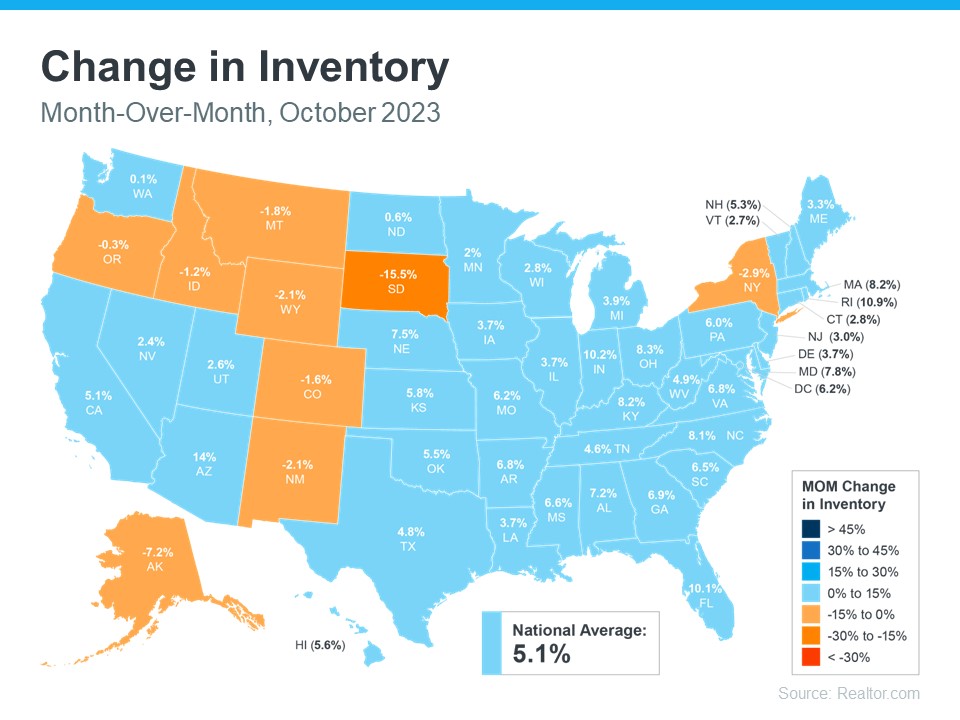
Looking at the map, nationally, the housing supply has increased just over 5% last month alone.
Does This Mean the Days of Limited Housing Inventory is Over?
Many people are wondering if the days of limited housing supply is behind us. This is a fantastic question. The short answer is no. Understanding the full picture here is important. Headlines are stating that inventory is up. The statement is true when compared to the most recent market, but when you look further back, data shows that there are still significantly less homes for sale now than typically listed in a more normal market.
Let’s discuss the graph below.
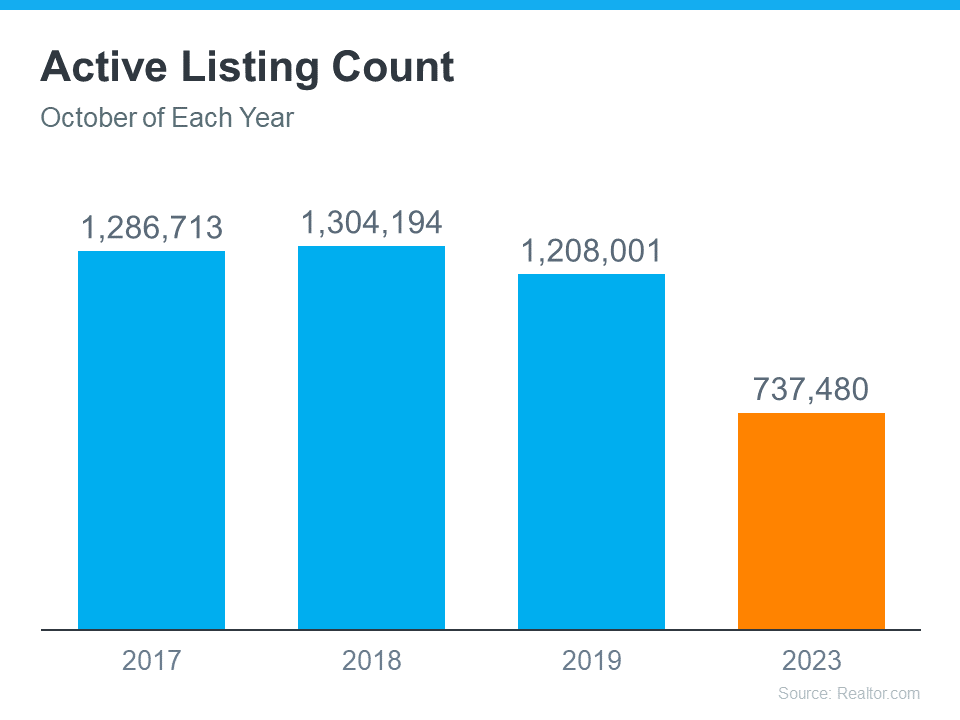
This graph demonstrates homes listed for sale during the month of October for the three most recent normal years compared to homes listed in the month of October in 2023. As you can see there are significantly less homes listed in 2023 than in that of a normal market. Viewing this helps explain comments like the one ResiClub Analytics, founder, Lance Lambert made where he said, “Housing market inventory is so far below pre-pandemic levels that October’s big jump is still just a drop in the bucket.”
At the end of the day, real estate is hyper-local and changes vastly between locations. It is of the utmost importance, especially in times like these, to look to your trusted real estate agent for clarification of the market as they will help you gain better understanding of the inventory situations in your specific market. Don’t have an agent? Connect with us here.
If You Are Looking to Buy:
You might discover more options than you have in the most recent months. However, it would behoove you to prepare yourself for low inventory. Find yourself a great agent that will share their expertise and strategies that have helped others navigate today’s ongoing low housing.
If You Are Looking to Sell:
Know that you have not missed your window of opportunity to potentially get multiple offers or see your house sell quickly. While inventory has picked up some nationally, overall, it is still low. Having a professional Realtor on your side can help you significantly in understanding the market you are in. A great agent can craft your home a unique marketing plan that meets the requirements of the market to get your home sold.
Regardless of weather you are looking to buy or sell a home, let’s connect so that you are up to date on all of the latest trends that could potentially impact your move.
Extend the Life of Your Herbs

Don’t give up on your gardens just yet!
These 5 alternative approaches will have your herb garden thriving all winter long.
Just because the temperature has changed doesn’t mean your green thumb has to hibernate! You just need to modify your approach to stay gardening throughout the cold season.
Are you ready to start producing flavorful foliage all winter long?
Cold-resistant herbs like chives, mint, oregano, parsley, sage, and thyme tend to withstand the cold better than some of their counterparts such as rosemary. Regardless, any of these can survive when they follow these five steps.
-
Encase your herbs using cold frames or cloche.
Cold frames and cloches protect your herbs from the cold by encasing the entire plant. The enclosure traps the heat rising from the soil, raising the temperature several degrees when it otherwise would be too cold. This can promote further growth of your herbs.
What is a “cold frame” or a “cloche”? A cold frame is a house-shaped frame with glass panels that slope downward in position that capture the most sunlight for the enclosed plant. Cloches tend to be smaller in size and significantly more portable. Traditionally they are glass and bell-shaped. However, their higher price tags have encouraged the DIYers to create their own using cut-off milk jugs or soda bottles to enclose each plant. If you choose the DIY approach, don’t forget to push the edges about an inch or two below the soil to prevent them from blowing away. You can purchase plastic ones here.
-
Cover in mulch or straw.
Like a warm blanket, a thick layer of mulch or straw will allow your herbs to continue growing in the cold season. This approach works best in places that don’t experience extreme cold. When you would like to harvest, simply pull back the mulch or straw blanket, cut the herbs you need, and then return the mulch/straw blanket to its place. Keep in mind your herbs will not produce at the same rate as they did during the warmer seasons. If a small layer of snow falls atop the mulch/straw blanket it will act as additional insulation. When spring returns you can turn the mulch/straw blanket into the soil with little to no waste.
-
Repot your herbs and transport them inside to a greenhouse or sun porch.
If you are growing your herbs in the ground one of the most popular options for keeping them alive and producing is to repot them and move them somewhere warmer. The optimal way to accomplish this is by first trimming them back to about an inch tall making them easy to transport. You can use the trimmings and if there are extra follow step 5. Using a sharp shovel separate them at their bases ensuring that the roots of each one will fit into its container with well-draining planting mix. They will grow back when replanted in the garden in the spring.
-
Grow herbs in your sunny window.
Herbs can add that extra greenery to your kitchen window. Make sure they receive at least six hours of sunlight a day. If not, you can use artificial light to supplement, keeping in mind it takes about 14 hours of artificial light versus the six hours of sunlight per day. Keep your plants in an atmosphere where the temperature ranges between 60 and 70 degrees Fahrenheit. Use a well-draining potting mix and water often.
-
Extend life in a cup of water.
Some plants don’t need soil at all. You can place a cut of basil, mint, sage, oregano, thyme, and green onions in a cup of water on your window sill and they will begin to produce roots and grow new leaves. This is a great way to get extra from your harvest.
Be sure to remove lower leaves to keep them from being submerged in the water.
Keep in mind all plants will do better outside but these ones are a great alternative. Their leaves might be thinner and a tad less flavorful, but they will still be fresh for weeks to come.
If you liked this article, you can find other useful household articles by searching our blogs. Keep reading here.
Knowing When You’re Ready to Buy

Homeownership is a lifestyle choice. Therefore, choosing homeownership isn’t a decision made overnight. The decision often takes careful planning for how the purchase of a home will fit into your life now and in the future. Additionally, the decision will take financial planning for how to pay for the home of your dreams. How will you know if you are ready? Follow along as we explain the fundamentals of preparing for homeownership so that you know when the time is right for you.
When renting…
When renting, you usually don’t have to worry about maintaining the property, making repairs, or remodeling the home. Are you ready to take on those responsibilities as a homeowner? If so, are you ready to be tied down to one place? Renting offers a bit of flexibility because leases are renewed on a regular basis allowing you ease of relocation. As a homeowner you’ll need to spend time and money selling or renting out your home before relocating.
As a renter you never gain any long term savings in the form of home equity. As a homeowner, the longer you are in the home the more equity you can expect to gain. You can get a better idea of why by the explanation in our article, Is It Better to Buy a Home or to Rent One?.
A couple of good questions to ask yourself if you are considering becoming a homeowner are:
If you needed to move in a couple years, would you feel comfortable renting out your home or selling it?
Could it potentially bring in a cash flow?
As a homeowner you are ultimately responsible for paying the mortgage. Are you financially stable enough to not default on your loan?
Most importantly, becoming a homeowner means putting down roots. Are you and your household emotionally ready to make that change and commitment?
If you answered yes to the above questions, you are on your way to homeownership. Let’s dig a little deeper to see if you are financially ready to take the leap:
Do you know how much home you can afford?
There are a lot of factors that play into knowing how much home you can afford. Of course, there is the price of the home, but you must also consider interest rates as they play a significant role in your monthly mortgage payment. For a good demonstration of the effect of interest rates on your monthly mortgage payments check out this article, Rising Mortgage Rates. Furthermore, what many first-time home buyers forget to consider in addition to the down payment and monthly mortgage payments are closing costs, moving expenses, inspection fees, property taxes, and homeowners’ insurance just to name a few. A great agent will connect you with a lender that will walk you through how these will affect your payment and if they pertain to your loan. Don’t have an agent? Connect with us here to get paired with the perfect agent for you. Identifying how much you can afford is not a task to do alone. You must connect with a lender. They will look at your financial position and get you pre-approved for a home.
Are you working to reduce your debt-to-income ratio?
Lenders know that it is not realistic to have no debt. Therefore, lenders are looking to see that you are making progress towards paying down your debt. Demonstrate your plan to get your debt paid off. Your lender can help you determine the best course of action so connect with them sooner rather than later.
Are you prepared for a downpayment?
Lenders recognize 20% down payments as a demonstration of financial stability. 20% down payments decrease the initial risk to the lender and benefits the buyer by not having to pay PMI when they put 20% down. You can read more about those benefits here. However, we know not everyone can afford 20% down, but everyone needs a place to live. Therefore, there are different programs and flexible options that make owning a home attainable even when you do not have funds for a 20% down payment. It is important to talk to your lender to determine which fits your unique needs.
Maybe you already got a pre-approval letter, but you aren’t satisfied with the limits. You have several options. Provide your agent and lender with a clear expectation of your wants and needs. If you aren’t exactly sure what you want, try reading 6 Reasons to Attend Open Houses to solidify your desires. You can use this form to help identify your wants and needs to share with your agent and lender. Once you have a clear list your lender can help create a financial plan to reach your desired goal. Your agent can simultaneously watch the market for homes meeting your criteria and help you understand the dynamics of the local market. Knowing the market can help you understand your purchasing power. Your agent can help you understand the difference between a buyers’ and sellers’ market and help you understand what to expect and how to leverage the market to your advantage.
If you are ready to buy or still unsure, you should begin talking to an agent. If you don’t already have an agent, you are in luck! We have incredible agents and connections with lenders who can guide you through your unique situation and help you know when you are ready to purchase a home. Connect with us here.
State of The Nation’s Housing Explained

Harvard University’s latest edition of The State of the Nation’s Housing has arrived, and Windermere Chief Economist Matthew Gardner is here to break down what the data presented in the report means for the U.S. housing market in 2023 and beyond. Watch this video and if you have further questions you would like to discuss with a local agent call us at 360.675.5953 or connect with us here.

 Facebook
Facebook
 Twitter
Twitter
 Pinterest
Pinterest
 Copy Link
Copy Link



